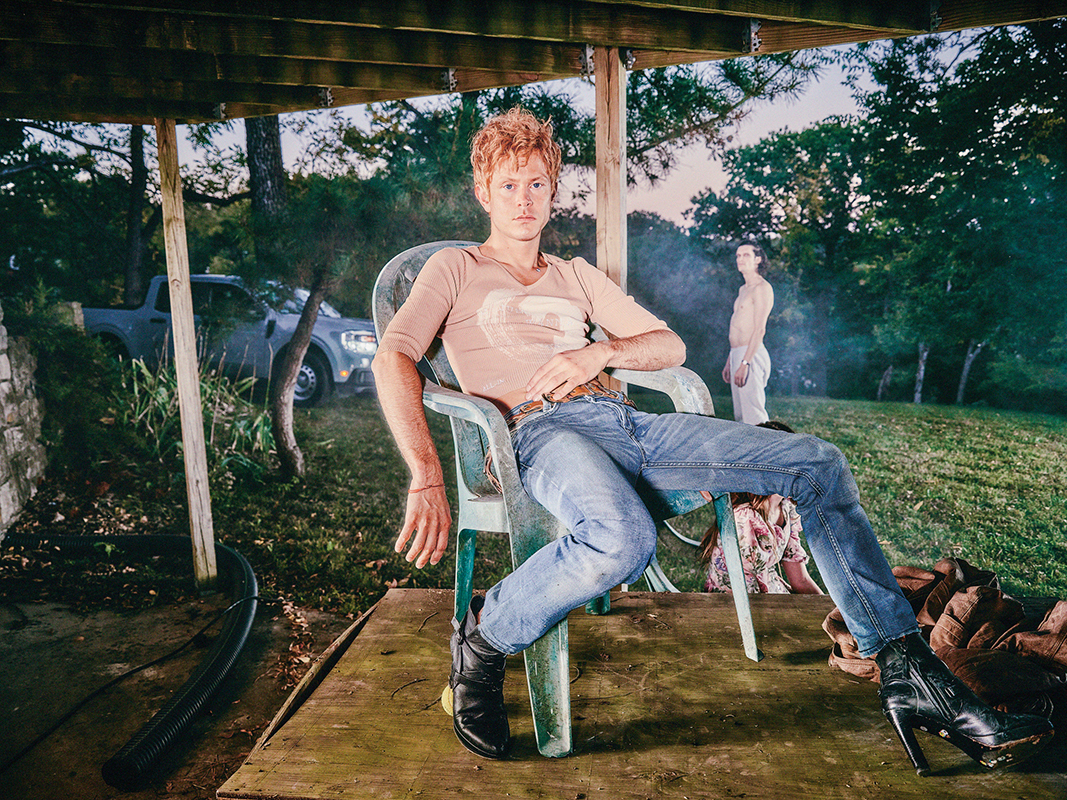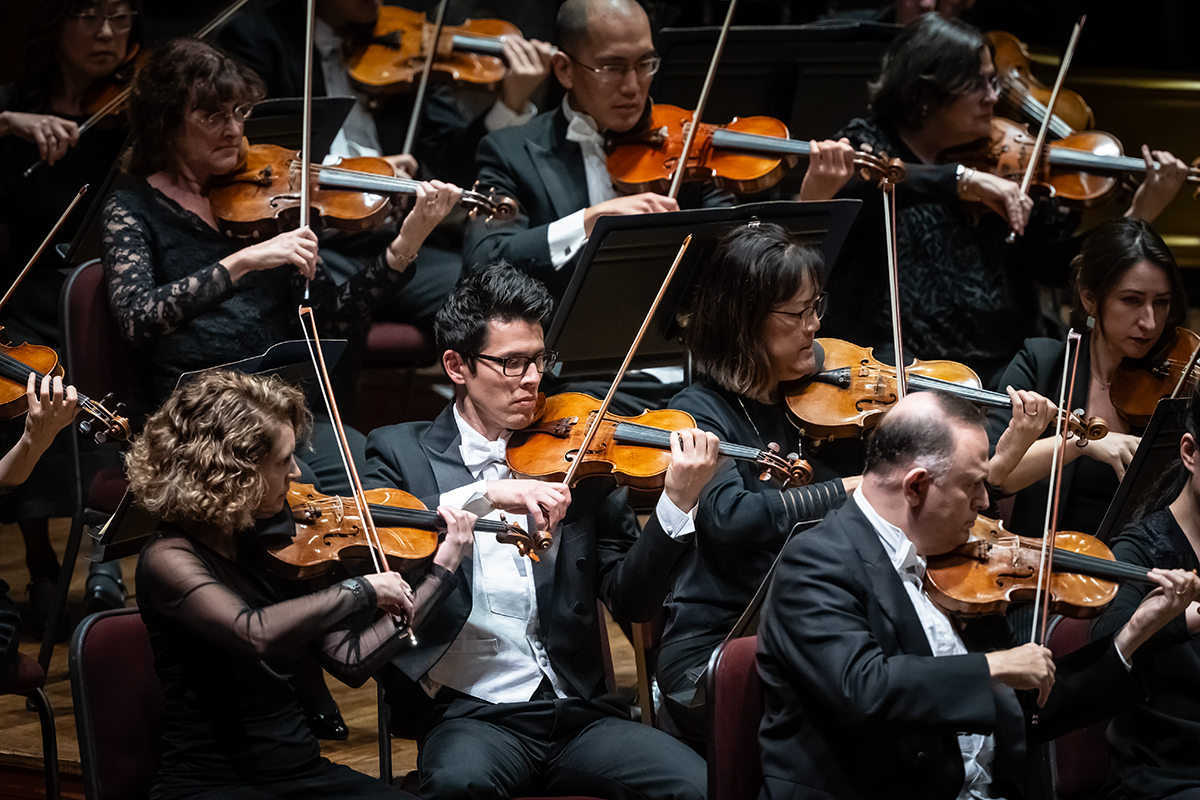The Glory and the Gloom
Washington National Opera bids farewell to its leader Placido Domingo with a somber and beautiful Iphigénie
With Placido Domingo singing his last role as general director of the Washington National Opera, it’s hard not to take the somber – at times downright mournful – mood of Gluck’s Iphigénie en Tauride to heart. Though he has lead the WNO for the last 15 years, one can’t help but feel just the teeniest bit abandoned, especially in light of the WNO’s financial woes and unevenness in recent seasons.

Iphigénie
(Photo by Scott Suchman)
It is even harder to not already miss a leader who has brought us so much to celebrate during his tenure. We have thrilled to so many superb productions: two equally magical and yet very different renderings of Madama Butterfly and Die Walküre; an edgy, exciting La bohème; operas from a most original American Ring via director Francesca Zambello; striking contemporary works such as Benjamin Britten’s Peter Grimes; and a Pearl Fishers designed with wild and colorful abandon by fashion design icon Zandra Rhodes. In between resided such crowd-pleasing staples as La Traviata, Don Giovanni and The Barber of Seville. And we have been treated to powerful productions of Janacek’s devastating Jenufa, Gershwin’s heartrending Porgy and Bess and Strauss’s beautifully tormented Elektra.
And then there is Domingo’s tradition of singing one role per season. Although his influence will remain through next season and he will conduct at least twice more (including this season’s closer, Don Pasquale), can we really expect his voice to grace the Opera House with anywhere near the frequency to which we’ve grown so accustomed?
Thus, knowing Domingo is, with Iphigénie, offering one of his last gifts as director and singer, we embrace the cold, strange world of Tauris, the prison-like land ruled by the ruthless King Thoas. Iphigénie, a Greek noblewoman whose family has been torn asunder by violence, serves on Tauris as high priestess to the Goddess Diana. After two shipwrecked Greeks wash ashore, Thoas demands that Iphigénie sacrifice one of the men to sate the gods. Unknown to Iphigénie, one of them is her brother, Oreste, who carries terrible guilt for his role in the family violence. When the moment of sacrifice finally arrives, Iphigénie recognizes Oreste and she pleases the gods even as she defies Thoas.
Hearing Domingo bring his extraordinary voice to the tortured Oreste and knowing it may be the last we hear him for some time, it is hard not to feel torn between misery and joy.
Domingo is an incredible baritone. Not only does he hold real presence and power in this range, he gives it the golden lift and expressive essence of his tenor. It is unusual, riveting and truly glorious. And even if his immediate, larger-than-life Oreste doesn’t quite gel with the more subdued ensemble and the coolly surreal aspects of the production, this is the Domingo we want to see bringing everything Gluck’s music could possibly ask.
As Iphigénie, Patricia Racette, last seen as an incomparable Jenufa, again amazes with her majestic, ever-so-lush soprano. Capturing the drama of Iphigénie’s plight and yet holding fast to Gluck’s ephemeral restraint, Racette continues to represent that new face of opera: the serious singer who can seriously act.
As King Thoas, bass-baritone Simone Alberghini cuts a striking figure, singing with power and color, if not always the best pitch. Holding forth from somewhere in the balconies, Domingo-Cafritz Young Artist Jennifer Lynn Waters sings a convincingly imperious Goddess Diana, even if there is just the slightest edge to her powerful soprano.



 and ONE HALF STARS
and ONE HALF STARSTo May 28
Kennedy Center Opera House
$65-$300
202-467-4600
kennedy-center.org
As for Luis Antonio Suarez’s set and the costumes for the king and his dancers by Pepa Ojanguren — well, you will love them, hate them, or not really know how you feel about them. Cast as a concrete bastion whose walls occasionally open to reveal a discrete tapestry of stars or a band of lurid fluorescence, this is a set that refuses to distract from Gluck’s controlled torment. If it is meant to suggest Iphigénie’s sense of imprisonment, it also borders on the intolerably bland.
Looking like something out of a space-age cabaret/swim club, King Thoas and his dancers are visually compelling if thoroughly mystifying in their garb. Although the prosthetics given one of the dancers are certainly fascinating, they are too much of a distraction. Still, Diniz Sanchez’s choreography is vibrant, interesting and adds much to the dramatic tension. The cipher-like but intriguing priestesses surrounding Iphigénie are nicely choreographed even if their costuming suggests eveningwear topped by makeup and headwear evoking a Blair Witch fashion shoot.
Maestro Domingo has ensured that we are given – yet one more time – an important and beautiful work to savor. To stand and clap for this superb production is to send thanks to a leader who has brought many of the best and the brightest to the Washington National Opera.
Support Metro Weekly’s Journalism
These are challenging times for news organizations. And yet it’s crucial we stay active and provide vital resources and information to both our local readers and the world. So won’t you please take a moment and consider supporting Metro Weekly with a membership? For as little as $5 a month, you can help ensure Metro Weekly magazine and MetroWeekly.com remain free, viable resources as we provide the best, most diverse, culturally-resonant LGBTQ coverage in both the D.C. region and around the world. Memberships come with exclusive perks and discounts, your own personal digital delivery of each week’s magazine (and an archive), access to our Member's Lounge when it launches this fall, and exclusive members-only items like Metro Weekly Membership Mugs and Tote Bags! Check out all our membership levels here and please join us today!























